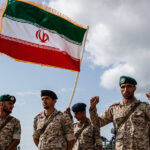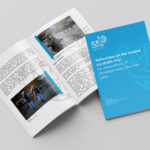During past decades, many initiatives have been proposed for regional cooperation in the South Caucasus, mainly coming from Georga and Turkey. In 1999, then-Georgian President Eduard Shevardnadze proposed the creation of the “Peaceful Caucasus Initiative” which was followed by Suleyman Demirel’s “Stability Pact for the Caucasus.” Later in 2008, then-Prime Minister of Turkey, Recep Tayyip Erdoğan, proposed the “Caucasus Stability and Cooperation Platform” while then-Georgian President Mikheil Saakashvili promoted the idea of “United Caucasus.” Despite many ambitious plans, none of the initiatives ever came into force.
In December 2020, after the end of the Nagorno-Karabakh War, bolstered by Turkey’s growing influence in the South Caucasus, Turkish President Recep Tayyip Erdoğan once again made a proposition on a new regional cooperation platform. However, this time he suggested creating a new format, the Six Country Regional Cooperation Platform, which would encompass the three states of the South Caucasus (Georgia, Azerbaijan, and Armenia) together with the greater states surrounding the region (Turkey, Russia, and Iran). During his speech at the victory celebration in the Azerbaijani capital of Baku, Erdogan underlined the need for regional cooperation in the Caucasus region, as it could be a win-win game for all participating sides and could even “turn a new page in Turkey-Armenia ties”.
In the meantime, Iran also proposed the creation of a similar six-party cooperation union in the region referred to as the 3+3 platform. To introduce the initiative and discuss how to cooperate and “make coordination on regional issues” Iranian Foreign Minister Javad Zarif made trips to the other five countries envisaged in the proposed platform. Nevertheless, to date, no practical steps have been taken in implementing the project, as it has been mainly part of diplomatic discussions. Iran, Turkey, and Azerbaijan have been enthusiastic about the project, and Russia has approved of the initiative as well. Nevertheless, the initiative has not been met with the same enthusiasm by Georgia and Armenia.
A new opening for influence
Russian President Vladimir Putin, who recently increased Russia’s military presence in the South Caucasus by stationing Russian troops in Nagorno-Karabakh, has been “keen” on the idea, according to Erdoğan. On October 6, Russian Foreign Minister Sergey Lavrov even made an announcement that Moscow was committed to the establishment of a new 3+3 format to “address the issues of security [and] unblocking economic and transport ties.”
This comes as no surprise as the Kremlin has long sought to increase its leverage on its post-Soviet neighbors to undermine the Western encroachment in the region of its “special interests”. Russia has been on the lookout to make it difficult for the Biden Administration to reiterate America’s role in the former Soviet space and strengthen cooperation in the region, especially with its strategic partner, Georgia. The second Karabakh war has been an opening for the Kremlin to reassert its influence in the South Caucasus region.
In the meantime, Turkey has been set on expanding its regional influence as well. The Turkish government has realized Russia’s importance in the region and despite a competitive relationship with Moscow, it has sought to work with Russia to achieve its own regional ambitions. For instance, since the end of the war, Turkey, alongside Azerbaijan, has been pushing for the construction of a transport link between Azerbaijan and Turkey via southern Armenia that could solidify Ankara’s transport connection with the South Caucasus and, at the same time, boost the region’s geo-economic importance, something that largely attracts Azerbaijan as well.
Iran could gain more than any side of the initiative. Tehran was largely absent in the war and did not gain a new footing in the South Caucasus like Turkey and Russia. Iran, however, remains the only country that has maintained regular diplomatic relations with all three countries in the South Caucasus. Armenian-Turkish relations have not yet been restored, and relations between Georgia and Russia have been tense since 2008. Hence, Iran would be the only participating country to obtain a leading position in the platform and host high-level meetings.
Moreover, Iran sits astride two important trans-continental transportation corridors: the North-South Corridor and the Persian Gulf–Black Sea Transit Corridor. The South Caucasus is a gateway for Iran, as a land route via Armenia and Georgia plays an essential role for Tehran’s economy, facilitating the main transport gateway for Iran to the Black Sea and on to Europe. In the aftermath of the 2020 Karabakh war, Baku took control of the territory critical for Iran’s land transportation routes. The Azerbaijani government has imposed a tough policy on entries into the territory via Armenia, furthering recent tensions that have developed between Tehran and Baku. In this situation, Tehran’s 3+3 cooperation plan for the South Caucasus region could combine these two important and strategic transit corridors. Tehran would warm tensions with Azerbaijan and guarantee safe passage of its trucks headed towards Armenia. Through developing trans-border rail networks under the framework of a six-state initiative, Iran could boost its importance as one of the major regional players.
Cautious Georgia and Armenia
Although Azerbaijan has expressed support for the proposed initiatives put forth by Iran and Turkey, Georgia and Armenia have shown reluctance. Both initiatives are similar in their form and content, especially when it comes to members states and major areas of cooperation: economy and transport.
Armenia has serious concerns due to the unfavourable outcome of the Karabakh conflict and its difficulty to absorb a new reality. The peace between Armenia and Azerbaijan has been fragile since the end of the war. Although Armenian Prime Minister Nikol Pashinyan has recognized that cooperating with Azerbaijan and Turkey would benefit Yerevan and even showed preparedness to normalize relations with Turkey, no tangible results have been achieved in this regard yet. On the contrary, post-war border tensions between Baku and Yerevan have further undermined peace prospects between the two countries, deepening the sense of insecurity in Yerevan. Concerns in Yerevan have been exacerbated by the continued refusal of Azerbaijan to release Armenian prisoners, and reports of the torture and death of Armenians while in Azeri custody.
A substantial issue for Yerevan is the interpretation of Article 9 of the November 2020 Karabakh war ceasefire agreement. The Azerbaijani side believes the document gives it the right to establish an overland transit corridor linking mainland Azerbaijan with its Nakhchivan exclave via southern Armenia’s Syunik province, what Azerbaijan refers to as the Zangezur corridor. Nevertheless, the Armenian side interprets the reference to the term ‘corridor’ as referring only to the Lachin corridor, a narrow strip which connects Armenia with Nagorno-Karabakh. Moreover, the situation has become even more strained after several comments from Azerbaijani officials that southern regions of Armenia used to be the “ancestral land” of Azerbaijanis, which have slowed down the peacebuilding processes.
The initiative is even more concerning for Georgia as it is inherently incompatible with the country’s national interests. Russia, which is envisaged as one of the members of the platform, still occupies Abkhazia and South Ossetia, accounting for 20 percent of Georgia’s internationally recognised territory. For more than a decade, Russian occupying forces have demarcated along, and allegedly beyond, the administrative lines between Georgia and occupied territories, which is referred to as ‘illegal borderization’. Hence, it is implausible that Georgia would join a platform that includes Russia as a member. Georgian government officials have stated it would be difficult to take part in any regional body with Russia unless Moscow ends its occupation of Abkhazia and South Ossetia. “We have reiterated our position that it would be hard to cooperate with the occupier [Russia] in this framework, as we do not see any progress with regard to de-occupation. It is hard to talk about any kind of infrastructure projects,” stated Georgian Foreign Minister David Zalkaliani. Strikingly, he also underlined the importance of Georgia’s participation in regional initiatives to “not to fall behind the developing processes in the region” and to maintain the country’s important role in the region. However, considering the public outrage that followed the Foreign Minister’s announcement, it is dubious that Georgia would consider becoming a member of the initiative.
Tbilisi could also take concern over new transport corridors that could bypass Georgia. The construction and restoration of railway and land routes across the region as provided for by the January trilateral agreement between Russia, Armenia and Azerbaijan has envisioned a new transit reality for the South Caucasus. Armenia could acquire a new transit function, while Azerbaijan would have the opportunity to further diversify its transport connections with global markets. Some Georgian experts believe that new transit routes could downgrade Georgia’s regional transit role.
In the meantime, concerns in Georgia grow as the European Union and United States continue to maintain a minimal presence in the South Caucasus. Tbilisi is eager to deepen its integration in European and Euro-Atlantic institutions, especially following the 2008 war with Russia. Since then, around 80 percent of Georgia’s population has expressed support for Georgia’s integration into the European Union and NATO; Russia has been considered the biggest threat by the majority of the population. In light of these realities, it is unlikely that Georgia would seek to join an alliance that could detract from its prior ambitions.

